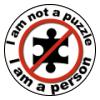I've not been around as much as I would have liked for a while now....I've been trying to work through some things in my own mind.
Being the parent of a premature baby is devastating, it leaves you reeling, full of guilt and sorrow for the things that have happened, and the things that might have been, we post our stories in the hope that it may inspire parents who are going through the same things we went through. To show that it's tough, that life with a preemie has no certainties, but that they are not alone, in that others have gone through what they are currently experiencing.
The following has left me reeling, because I really struggle to comprehend, what I am seeing. The following is a link to a website....Go look at the pictures.
http://www.geocities.com/wilhelm_chance/
The top baby, he belongs to a friend of mine Shelley I first saw this picture a couple of years ago, there is no mistaking, that that babies real name, is Jacob. As you can imagine, Shelley is devastated, that someone has chosen to steal her son's identity in an attempt to pass him and this other baby off as their own "twins" As hard as she has tried she has not been able to locate the person who built this website.
As for the second baby we have no idea who that baby belongs to, go have another look, do you recognize him or her?? Do you know his mum or dad?? If so maybe you need to send them the link to the above website, so that they can see what some sickening person has done with their child.
Why would someone want to do this?? Why would someone want to steal the identity of two babies neither of whom belong to them and pass them off as their own?? Why would someone want to create grief and upset to parents who have already struggled enough to cope with their experiences......
Maybe this will go someway to explaining it.....
Munchausen by Internet
:Faking Illness Online
by Marc D. Feldman, M.D
Online Support for People with Illness - The Internet is a medium of choice for millions of people who need health-related information. Medical websites have multiplied exponentially over the past several years.
Thousands of virtual support groups have sprung up for those suffering from particular illnesses. Whether formatted as chat rooms, as newsgroups, or in other ways, they offer patients and families the chance to share their hopes, fears, and knowledge with others experiencing life as they are. These online groups can counter isolation and serve as bastions of understanding, deep concern, and even affection.
Unfortunately, cyberspace resources are sometimes deliberately misused by people intent on deceiving others. False product claims in spam are perhaps the best-known example. But even in the relative intimacy of health support groups, individuals may choose to mislead others by pretending to have illnesses they do not. They divert the attention of the group toward their feigned battles with cancer, multiple sclerosis, anorexia nervosa, or other ailments. The eventual discovery of the deceptions can be devastating.
One group member called it "emotional rape" to have cared so deeply about a person who lied to her and others from his first post on.
Munchausen by Internet -
For decades, physicians have known about so-called factitious disorder, better known in its severe form as Munchausen syndrome (Feldman Ford, 1995). Here, people willfully fake or produce illness to command attention, obtain lenience, act out anger, or control others. Though feeling well, they may bound into hospitals, crying out or clutching their chests with dramatic flair. Once admitted, they send the staff on one medical goose chase after another. If suspicions are raised or the ruse is uncovered, they quickly move on to a new hospital, town, state, or in the worst cases — country.
Like traveling performers, they simply play their role again. I coined the terms "virtual factitious disorder" (Feldman, Bibby, Crites, 1998) and "Munchausen by Internet" (Feldman, 2000) to refer to people who simplify this "real-life" process by carrying out their deceptions online. Instead of seeking care at numerous hospitals, they gain new audiences merely by clicking from one support group to another. Under the guise of illness, they can also join multiple groups simultaneously. Using different names and accounts, they can even sign on to one group as a stricken patient, his frantic mother, and his distraught son all to make the ruse utterly convincing.
Clues to Detection of False Claims - Based on experience with two dozen cases of Munchausen by Internet, I have arrived at a list of clues to the detection of factititous Internet claims. The most important follow:
1) dthe posts consistently duplicate material in other posts, in books, or on health-related websites;
2) the characteristics of the supposed illness emerge as caricatures;
3) near-fatal bouts of illness alternate with miraculous recoveries;
4) claims are fantastic, contradicted by subsequent posts, or flatly disproved;
5) there are continual dramatic events in the person's life, especially when other group members have become the focus of attention;
6) there is feigned blitheness about crises (e.g., going into septic shock) that will predictably attract immediate attention;
7) others apparently posting on behalf of the individual (e.g., family members, friends) have identical patterns of writing.
Lessons - Perhaps the most important lesson is that, while most people visiting support groups are honest, all members must balance empathy with circumspection. Group members should be especially careful about basing their own health care decisions on uncorroborated information supplied in groups. When Munchausen by Internet seems likely, it is best to have a small number of established members gently, empathically, and privately question the author of the dubious posts.
Even though the typical response is vehement denial regardless of the strength of the evidence, the author typically will eventually disappear from the group. Remaining members may need to enlist help in processing their feelings, ending any bickering or blaming, and refocusing the group on its original laudable goal.
References: Feldman, M.D. (2000): Munchausen by Internet: detecting factitious illness and crisis on the Internet. Southern Journal of Medicine, 93, 669-672Feldman, M.D., Bibby, M., Crites, S.D. (1998): "Virtual" factitious disorders and Munchausenby proxy. Western Journal of Medicine, 168, 537-539Feldman, M.D., Ford, C.V. (1995): Patient or Pretender: Inside the Strange World of Factitious Disorders. New York, John Wiley Sons.
We live in a sick sad world....
Monday, December 19, 2005
Subscribe to:
Post Comments (Atom)








No comments:
Post a Comment